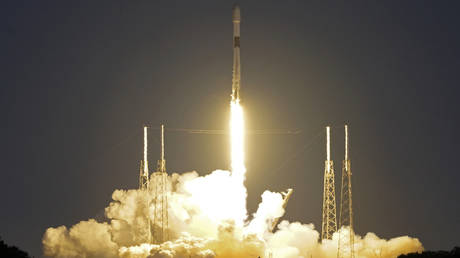
A geomagnetic storm wiped out over 80% of the Starlink satellites deployed by SpaceX last Thursday
Elon Musk’s SpaceX lost 40 out of 49 Starlink satellites launched via a Falcon 9 rocket, losing their orbit thanks to a geomagnetic storm, the company revealed on Tuesday.
By now, almost all of the lost satellites have either already re-entered or will soon re-enter the Earth’s atmosphere where they will eventually burn up before reaching the ground, meaning they won’t scatter debris, SpaceX explained.
SpaceX placed the satellites into lower orbit approximately 210 kilometers above Earth for the initial system checkout before moving them to a higher orbit through a controlled flight. The scheme was designed to make the satellites quickly deorbit through atmospheric drag should they fail the tests, the company said.
This time, however, the plan went awry as the satellites were hit by a geomagnetic storm last Friday while still in low orbit. Such storms, described by the US Geological Survey as a period of “rapid magnetic field variation,” are caused by a surge of solar winds. The storm caused an atmospheric drag that was 50% stronger than usual.
The team sought to make the satellites “take cover from the storm” by commanding them into a safe mode to minimize the effects of the drag. Still, the storm prevented 40 of them from leaving safe mode and starting orbit-raising maneuvers, SpaceX explained.
Nonetheless, the company hailed the incident as an example of the “great lengths the Starlink team has gone to ensure the system is on the leading edge of on-orbit debris mitigation.” It explained that deorbiting satellites pose “zero collision risk” with other satellites, would create no space debris and would not hit the ground.
SpaceX’s Starlink is a satellite network designed to provide broadband internet access covering most of Earth. In January, CEO Elon Musk boasted that 1,469 Starlink satellites were currently active in low orbit.
The project has sparked controversy as astronomers voiced concerns about huge constellations of satellites in low orbit interfering with their research and particularly affecting space observations.
China also criticized the project. Beijing even lodged a complaint about SpaceX with the UN Office for Outer Space Affairs in December 2021, claiming that its astronauts had to conduct evasive maneuvers to avoid Starlink satellites on two separate occasions as they were on board the China Space Station.




